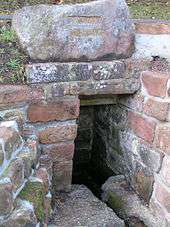Eckbach Mill Path
| Eckbach Mill Path Eckbach-Mühlenwanderweg | |
|---|---|
|
Wooden signpost with logo and name | |
| Length | 23 km |
| Location | Leiningerland (Palatinate, Rhineland-Palatinate) |
| Trailheads |
Hertlingshausen 49°29′47.2″N 8°0′52.5″E / 49.496444°N 8.014583°E Dirmstein 49°33′34.5″N 8°14′43″E / 49.559583°N 8.24528°E |
| Use | Hiking |
| Elevation | |
| Elevation change | 200 m |
| Highest point | 308 m |
| Lowest point | 108 m |
| Hiking details | |
| Trail difficulty | easy |
| Season | all-year round |
| Waymark | wooden signposts with the logo |
| Sights | 23 historic mills, mill museum, many other structural monuments |
The Eckbach Mill Path (German: Eckbach-Mühlenwanderweg) is a footpath in the German state of Rhineland-Palatinate. It is 23 kilometres long and runs gently downhill along the Eckbach river through the Leiningerland in the northeast of the Palatinate region.[1]
Course

The trail runs from west to east/northeast through the collective municipalities of Hettenleidelheim and Grünstadt-Land. It links nine villages and 23 of the original 35 water mills, running from the Palatinate Forest through the vineyards along the German Wine Road to the edge of the Upper Rhine Plain. The height difference between the start and end points (Hertlingshausen 308 metres, Dirmstein 108 metres) is 200 metres, the cumulative gain and loss over the generally gently descending route is only 250 metres, hence its difficulty is assessed as easy.
The route, which is accessible all year round, is marked by wooden signposts, made and maintained by voluntary workers. They bear the mill logo and the name Eckbach-Mühlenwanderweg. The logo depicts a house and waterwheel above a wavy line and was designed by Cosmas Kösters from Kirchheim in a school competition. The wavy line symbolizes the Eckbach, the stylized house with a water wheel represents a mill.
History
The path was created as a tourist attraction initiative of mill researcher, Wolfgang Niederhöfer, from Kleinkarlbach. On 12 October 1997 it was inaugurated by the minister president of Rhineland-Palatinate, Kurt Beck, in Großkarlbach, the village with the most surviving mills (six of seven). The suggestion made at the time to make the Großkarlbacher village mills a cultural monument and create the Leiningerland Mill Museum (Mühlenmuseum Leiningerland) was achieved in 2007.
Originally the route began by the Eckbachweiher pond and was only 19 kilometres long,[2] but in 2000 it was extended by 4 kilometres upstream to the source of the Eckbach in Hertlingshausen.[1]
-
Rock mill in Neuleiningen-Tal
-

Village mills in Großkarlbach
-

Eastern end of the route: The Spormühle in Dirmstein
Places and mills
- Hertlingshausen[A 1]
- Altleiningen[A 2]
- Neuleiningen-Tal[A 3]
- Obermühle ("Upper Mill")
- Felsenmühle[A 4] ("Rock Mill")
- Kleinkarlbach
- Walkmühle ("Waulk Mill")
- Wiesenmühle ("Pastureland Mill")
- Bann- and Backmühle
- Strohmühle ("Straw Mill")
- Schleifmühle ("Grinding Mill")
- Langmühle ("Long Mill")
- Kirchheim an der Weinstraße
- Kandelmühle or Oligmühle
- Eselsmühle ("Donkey Mill")
- Kochsche Mühle (locally known as the Gräfliche Leininger Mühle, "Leiningen Comital Mill")
- Bissersheim
- Bruchmühle
- Haldmühle ("Mill in the Hollow")
- Bergmühle ("Hill Mill")
- Großkarlbach
- Laumersheim
- Weidenmühle ("Meadow Mill")
- Hornungsmühle
- Dirmstein[A 7]
- Spormühle[A 8]
- Footnotes to the list:
- ↑ Point of interest: the source of the Eckbach in the parish of Kleinfrankreich
- ↑ Point of interest: the 20-Pipe Well which supplies the Eckbach
- ↑ Point of interest: the Eckbachweiher pond
- ↑ Felsenmühle guest house and tourist inn
- ↑ Frank’s Bodega disco since 2009
- ↑ Leiningerland Mill Museum (Mühlenmuseum Leiningerland) since 2007
- ↑ The former Lower Mill was converted in the 19th century into a farmstead (Hofgut) which is now protected.
- ↑ Spormühle art gallery and country hotel
References
Literature
- Verbandsgemeinde Grünstadt-Land; Wolfgang Niederhöfer, eds. (1997) (in German), Einweihung des Mühlenwanderweges am 12.10.1997 : Festschrift, Grünstadt und Kleinkarlbach
- Verbandsgemeinde Hettenleidelheim, ed. (2001) (in German), Das Wandern ist des Müllers Lust... auf dem Rad-, Kneipp- und Eckbach-Mühlenwanderweg, Hettenleidelheim
External links
- Description
- Map (pdf; 306 kB)
- Pfälzer Festgedicht zur Eröffnung 1997
